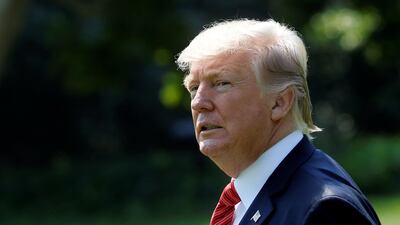Nato nations welcomed President Donald Trump’s backing for the mission in Afghanistan as officials revealed Washington was demanding extra troop deployments from its allies.
The 15-year old Nato operation in Afghanistan has already agreed to reinforce troop levels for the train, advise and assist role it offers to the country’s security forces. The number of troops in Afghanistan is due to rise to 15,800 from 12,400.
The Times newspaper reported that Britain, which 585 troops in the country, was under pressure to increase its commitment significantly. “The pressure is on everyone in the alliance,” a source told the newspaper.
Like other European governments, the British welcomed Mr Trump’s determination to fight terrorism in Afghanistan.
“The US commitment is very welcome,” Michael Fallon, Britain’s defence secretary, said. “It’s in all our interests that Afghanistan becomes more prosperous and safer: That’s why we announced our own troop increase back in June.”
“In my call with Secretary Mattis yesterday we agreed that despite the challenges, we have to stay the course in Afghanistan to help build up its fragile democracy and reduce the terrorist threat to the west,” Mr Fallon added.
Sir Adam Thomson, a former British ambassador to Nato, predicted that Europeans would respond positively to American pressure for extra troops. Mr Trump has already successfully demanded hikes in defence spending by Nato partners. Sir Adam pointed out that the Afghan operation is a Nato-led effort, not a US war that Europe has historically supported.
“This will be a test for the rest of Nato just as the 2% burden sharing demand is a test,” he told the National. “The US is pushing its allies to continue a Nato co-ordinated coalition by reaching higher figures.”
The reaction across Europe to the overnight speech, which was widely hailed as one of the most statesmanlike of Mr Trump’s presidency, was however muted.
________________
Read more
Trump's warning to Pakistan over terrorism meets with mixed reaction
Pentagon chief: ISIL's days are numbered
Trump promises to crush Al Qaeda and ISIL in Afghanistan
US in Afghanistan: Mattis confirms Trump administration has decided on new strategy
________________
An editorial in Le Monde, the centre-Left French daily, said Mr Trump had taken ownership of a conflict first taken on by President George W Bush and sustained by Barack Obama.
“The war in Afghanistan is a distant, difficult and thankless grind that has already claimed the lives of more than 2,000 Americans and thousands of Afghans, and is now his,” the editorial declared.
The German government has also declined to make any quick announcements on sending more forces but made clear its relief that Mr Trump had not precipitously withdrawn the US military from the central Asian battles.
“It is right and the federal government has long advertised that an end of the deployment is tied to the conditions on the ground,” a statement from Angela Merkel’s office said.
There was strong criticism of Mr Trump’s disavowal of nation building and investment in strengthening the Kabul government.
“I do not think it would be a good idea to increase the number of German soldiers. This conflict is not to be won by military forces, "said Thomas Oppermann, the foreign affairs spokesman for the junior coalition partner, the Social Democrats.
Retired British general Sir Simon Mayall said the even small numbers of extra troops could have a dramatic effect on the Afghan army and other security forces. He hoped Mr Trump’s speech would reverse the damage to morale inflicted by the rapid drawdown after 2015.
"The high levels of [Nato] troops were very helpful in giving the Afghans time to develop their own security forces, but then announcing we were going to leave in 2014 and running down very quickly was very bad,” he said. "I hope that what President Trump has announced will serve to redress a number of those weaknesses."
But Theo Farrell, a war professor and Nato adviser on Afghanistan, said he could not see a new approach from Washington that would transform the landscape. “Very little new or strategic in [Donald Trump’s] new strategy for Afghanistan – amounts to send in more troops and let’s see what happens.”


